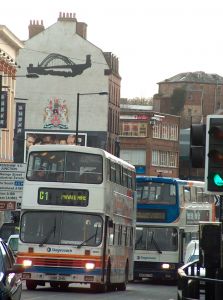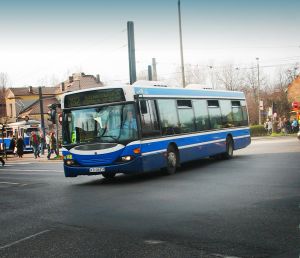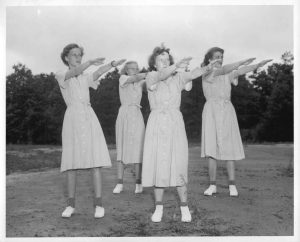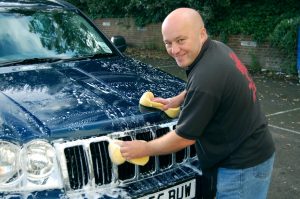welcome to the August edition of Impact Young Heroes ‘makeabigdifference’ newsletter; your one-stop shop for all the latest charity and fundraising news.
The holiday season is well a truly over! New terms are about to begin for schools, colleges and Universities and the countdown to Christmas is upon us. Soon, we will be bombarded by an assortment of media marketing and also shops full of lovely products; all set to encourage us to purchase gifts for our family and friends and also purchase larger items for ourselves, in the run up to the festive season. In this edition, we detail an easy way to avoid the ‘mad rush’ and purchase all of your ‘treats’ online and in the process raise funds to support Young Heroes.
Rob and Bev update us all on some good news for some young people, who are connected to Young Heroes and also on Rob’s great day out ‘on the buses’ and we also look at a number of new findings, regarding how coffee is now being reported to help reduce instances of bowel cancer and also how we can help to reduce our risks of cancer, by eating healthily.
Until next month, enjoy!
Celebrations all round!
It has been an exciting, but also anxious month for two of our Young Heroes, and a very special young lady, Charlotte Albiston, sister of the late Alexander Albiston.
Alex Dakin has been accepted at Liverpool University to study for a sports degree and Rosie Topps has been accepted into Leeds College, to undertake an animal care course.
The anxious wait for results, and to hear if they have been accepted into the Colleges and Universities of their choice, are made more stressful for our Young Heroes because their education is hampered by illness and treatments. This can lead to disappointments when their peers are taking exams that they should be undertaking, and a sometimes different route has to be considered.
Rosie, who will 20 years old in November, will be leaving home and living independently for the first time since she became ill at the age of 14years old with Acute Lymphoblastic Leukaemia (Rosie is currently in remission). However, she is still coping with the side effects of treatment, and having to attend many hospital appointments. However, this is a wonderful opportunity for her to make new friends, and embark on a course involving animals which she has always wanted to do.
Alex is delighted to be going to Liverpool University because his long time friend Josh, who has been with him on his journey whilst suffering with Acute Lymphoblastic Leukaemia (Alex is now in remission), is also going to study in Liverpool. Robert and I are selfishly a little disappointed, because he did want to come to York to study at York St John, but there were not enough places. It would have been fantastic to have Alex near to where we live, especially as Gem and Sharon his parents, keep in regular contact with us since their respite holiday in Lanzarote and we would loved to have seen more of them. However they are planning to come and stay with us next month which will be very special.
Charlotte has achieved her dream of going to Manchester University where she is going to study Politics. It is with her determination, sheer bravery and strength of character that Charlotte is going to follow her dreams. Not only did she have to see her brother Alexander suffer with Osteosarcoma, but also lose his battle with the disease 2 and half years ago.
We wish Alex, Rosie and Charlotte our Congratulations from all the team at Impact Young Heroes, and every success in all they do in the future. One thing is certain, Robert and I will be closely following their progress and we will always be here for them should the need arise, in whatever capacity.
ON THE BUSES “Come on you two, get that bus out or I’ll speak to the general manager and get you the sack.”
“Ok Blakey we’re on the road and you’re coming with us!”
“Who’s orders?”
“Impact’s!”
“Impact who?”
“Young Heroes of course, there’s only one.”
“And why am I coming?”
“You’re collecting for them today.”
“Collecting? I’m the inspector not a clippy.”
“ For once in your life Blakey you’re important, you’re on the make.”
“On the make?”
“Yes Blakey! You’re making as much money as you can get for those young heroes who’ll never be on the buses.”
“And don’t forget to tell them to gift aid it too.”
“And keep your ‘tache on today.”
“It’s too hot and sticky and keeps coming off.”
“That’s a pity it hides your face.”
So began a day on the buses.
At just after nine in the morning with the school children being delivered to school, I self consciously went down the High Street for the 9.20 bus to York. The shelter was full, and from behind hands covering large grins I was asked what I was up to. “I’m on a sponsored bus ride for Impact Young Heroes,” and the pennies then started hitting the bottom of my bucket together with their questions. “Why? Where to? What for? How long, and many others too?”
The morning promised to be bright with showers developing later, but the ride into York from Stillington through the villages of Huby and Sutton in the Forest was good fun, and many I knew from church, stopped those who would have walked by to give and find out what was happening. The ride from York through Tadcaster to Leeds was not so lucrative financially, but I was able to speak to a few students on their way to college about our work and the people we support.
At Leeds bus station I only had a few minutes to have my picture taken without my moustache as it kept falling off with the heat and humidity. From there I made my way across country to the east coast and up to Scarborough past the horse fair that was in full swing. There I had time for a little late lunch and a blow on the prom by the sea, dodging the showers that threatened, but still managing to catch the eye of a few people who emptied their coins into my bucket.
At the station waiting for my return bus to York a young mum told me the story of her young nephew who had died the year before from a brain tumour and her donation encouraged the rest of the people queuing to contribute too. The ride home to York was wet to say the least as the heavens opened as promised, but Malton soon came and went, and by the time we reached York the sun was out again. All but the ride back home I had completed the 170 mile round trip in just ten hours. I had shared a lot, raised about £490 most of which was gift aided, and had a wonderful day meeting people and simply being an advocate for our Young Heroes.
Diet, healthy eating and cancer
Experts think that nearly one in ten UK cancer cases are caused by unhealthy diets, according to Cancer Research UK.
Experts say our diet influences our risk of many cancers, including bowel, stomach, mouth, foodpipe and breast cancers.
Cancer Research UK’s website offers the following information:
You can reduce your cancer risk by eating a healthy, balanced diet that is:
- High in fibre (fibre-rich foods can reduce the risk of bowel cancer by at least a quarter). These include fruit and vegetables, wholegrain cereals, wholemeal and wholegrain bread, brown rice and pulses.
- Low in red and processed meat and salt.
“Superfoods”?
The term ‘superfood’ is used to describe foods with apparently special health-related powers. These include blueberries, broccoli, garlic, raspberries, green tea and many more. Typically, such foods are hailed as having the power to prevent or even cure many diseases, including cancer. But the term ‘superfood’ is really just a marketing tool, with little scientific basis to it. It’s certainly true that a healthy diet can help to reduce the risk of cancer but it is unlikely that any single food will make a major difference on its own.
Ten Top Tips
Cancer Research UK and Weight Concern have joined forces to develop Ten Top Tips for a healthy weight. These tips have been designed to fit into your daily life and are based on the best scientific evidence.
The tips are simple habits that people can permanently fit into their daily routines. Keeping up all ten tips in the long term will help you lose weight and keep it off.
- Keep to your meal routine. Try to eat at roughly the same times each day, whether this is two or five times a day. This will help you to avoid unplanned meals and snacks which are often high in calories.
- Go reduced fat. Choose reduced fat versions of foods such as dairy products, spreads and salad dressings where you can. Use them sparingly as some can still be high in fat.
- Walk off the weight. Walk 10,000 steps (about 60-90 minutes of moderate activity) each day. You can use a pedometer to help count the steps. You can break up your walking over the day.
- Pack a healthy snack. If you snack, choose a healthy option such as fresh fruit or low calorie yogurts instead of chocolate or crisps.
- Look at the labels. Be careful about food claims. Check the fat and sugar content on food labels when shopping and preparing food.
- Caution with your portions. Don’t heap food on your plate (except vegetables). Think twice before having second helpings.
- Up on your feet. Break up your sitting time. Stand up for ten minutes out of every hour.
- Think about your drinks. Choose water or sugar-free squashes. Unsweetened fruit juice is high in natural sugar so limit it to 1 glass per day (200ml / 1/3 pint). Alcohol is high in calories so try to limit the amount you drink.
- Focus on your food. Slow down. Don’t eat on the go or while watching TV. Eat at a table if possible.
- Don’t forget your 5 a day. Eat at least five portions of fruit and vegetables a day, whether fresh, frozen or tinned (400g in total).
The link between diet and cancer is complex and difficult to unravel. This is because our diet is made up of lots of different foods and nutrients. Most of these affect our risk of cancer, often in combination with one another. The genes you inherit also affect the way diet influences your cancer risk.
Scientists need to conduct very large studies to see which specific foods protect us from cancer, and which cause it. Many of these studies are underway and their results are already providing us with firmer answers.
For now, we know about the general types of food that can help to keep us healthy. And we know that a balanced diet will help to maintain a healthy body weight, which can itself reduce the risk of many cancers.
Article taken from Cancer Research UK, for more information see link: http://info.cancerresearchuk.org/healthyliving/dietandhealthyeating/%20?gclid=CNDHzLrdj7ICFaTJtAodcGkADQ
4 cups of coffee a day ‘protects against bowel cancer’
‘Six cups of coffee a day could cut the risk of bowel cancer by 40 per cent’ the Daily Mail explains, while The Daily Telegraph points out that just ‘four cups a day’ leads to a 15% rate of reduction.
The news follows a long-term study that tracked the behaviour and associated health outcomes of just under half a million Americans over the course of 10 years.
At the start of the study participants completed questionnaires on their diet and lifestyle and during the follow-up period the researchers looked at the number of colorectal cancers (commonly known as bowel cancer) that developed.
Those who drank four to five cups of coffee (caffeinated or decaffeinated) a day had a 15% reduced risk of developing cancer, while those who drank six or more had a 26% reduced risk, compared with non-drinkers.
Sadly for tea drinkers, there was no reduction in bowel cancer risk, but being a US study, the number of tea drinkers was relatively small.
This was a well conducted study that does suggest a link between coffee consumption and reduced bowel cancer risk. However, the researchers did recommend that further investigation into the link is needed, including study of the specific chemicals in coffee that could be having an effect.
It should be noted that caffeine is a stimulant, and drinking excessive amounts of it can lead to unwanted side effects, such as restlessness, insomnia and dehydration.
There are more well established methods of reducing your risk of bowel cancer such as taking regular exercise, eating a healthy diet and quitting smoking.
Where did the story come from?
The study was carried out by researchers from the US National Cancer Institute and Imperial College, London, and was funded by the Intramural Research Program of the US National Cancer Institute.
The study was published in the peer-reviewed American Journal of Clinical Nutrition.
The media is generally representative of this research, though they do not spell out some of the inherent limitations of a cohort study. This is important as it means that it is difficult to say whether a direct link exists between coffee consumption and bowel cancer risk. There may be other unidentified lifestyle factors that contributed to bowel cancer risk.
Some news stories also report the study’s finding that tea had no effect on cancer risk, without mentioning that few heavy tea drinkers were included in the study.
The advice from the Daily Express – supposedly from an ‘unnamed’ bowel cancer charity – that you should ‘consult your GP about coffee drinking first’ seems a little bizzare. In the absence of any serious health conditions you probably don’t need to check with your doctor if it is okay to drink four cups of coffee a day.
What kind of research was this?
This was a cohort study – the National Institutes of Health-American Association of Retired Persons (NIH-AARP) Diet and Health Study – which assessed various aspects of diet and lifestyle and has followed participants for a number of years looking at various health outcomes. This particular study examined information on coffee consumption which was collected at the start of the study, and looked to see how this related to the development of colorectal cancer.
Such a cohort study can demonstrate associations, but it cannot prove cause and effect as there may be other unmeasured factors that are associated with both coffee drinking and bowel cancer risk and so underlie the observed link. Also, self-reported coffee consumption at one point in time may not be a reliable measure of longer term patterns. The ideal way to investigate the effects that dietary factors have upon specific health outcomes would be a randomised controlled trial (RCT). However, an RCT of this type is arguably not feasible due to a number of factors, such as:
- time
- expense
- adherence (making sure people are not drinking too much or to little coffee)
What did the research involve?
Between 1995 and 1996 the NIH-AARP Diet and Health Study recruited AARP members, aged between 50 and 71 years old, from eight areas in the US. This study included 489,706 participants.
At the start of the study, participants completed a questionnaire which included information on sociodemographics (factors such as occupation and income), as well as:
- diet
- body measures
- lifestyle (such as physical activity and smoking)
This questionnaire included a 124-item food frequency questionnaire, which included information on intake and portion sizes over the past year. The researchers used the results of the questionnaire to classify people according to their coffee and tea intake. Coffee intake was split into six categories as follows:
- none
- less than one cup a week
- one cup a day
- two to three cups a day
- four to five cups a day
- six or more cups a day
Tea was assessed in five slightly different categories:
- none
- less than one cup a month
- one to three cups a month
- one to six cups a week
- at least one cup a day
Tea and coffee intake were also classified depending on whether the coffee or tea was caffeinated or decaffeinated more than half of the time. The researchers further validated their assessments by carrying out two, 24-hour dietary assessments of a sample of 1,953 participants. This assessment included information on whether the coffee was ground, instant or espresso.
Cancer cases were identified through linking to state cancer registries, which included codes for the specific type of cancer. Participants were followed for an average of 10.5 years to the end of December 2006.
The researchers analysed the association between tea and coffee intake and the development of cancer. In their analyses they adjusted for various potential confounding factors, including:
- sex
- age
- education
- smoking
- diabetes
- physical activity
- body mass index (BMI)
- red-meat consumption (a diet rich in red meat is a known risk factor for bowel cancer)
- fruit and vegetable consumption (a diet rich in fresh fruit and vegetables can reduce bowel cancer risk)
- alcohol intake
- the use of hormone replacement therapy (HRT) in women
What were the basic results?
There were 6,946 new cases of colorectal cancer during the 10.5 years of follow-up. In the baseline assessments, approximately 90% of the cohort drank coffee, and 16% reported drinking four or more cups a day.
- Compared with non-drinkers of coffee, those who drank four to five cups a day had a 15% reduced risk of developing colorectal cancer (hazard ratio 0.85; 95% confidence interval (CI) 0.75 to 0.96).
- Compared with non-drinkers of coffee, those who drank six or more cups a day had a 26% reduced risk (hazard ratio 0.74, 95% confidence interval 0.61 to 0.89).
- There was no significant association between coffee and cancer for those who drank three or fewer cups a day (neither increased nor decreased risk).
- When they split into caffeinated and decaffeinated coffee, the only significant associations were a 17% decreased risk for those who drank six or more cups of caffeinated a day, and a 21% decreased risk for those who drank four to five cups of decaffeinated a day.
- No significant associations were observed according to categories of tea intake. However, the majority of participants did not drink tea, with 62% of participants reporting no tea consumption at baseline.
How did the researchers interpret the results?
The researchers conclude that in their large US cohort, coffee consumption was inversely associated with colorectal cancer (that is, as intake goes up, risk goes down).
Conclusion
This study finds an association between coffee drinking and bowel cancer risk, and benefits from its large sample size and thorough follow-up of outcomes. It does, however, contain important limitations:
Reduction of risk was only seen at high levels of coffee consumption
The results don’t give a clear message about the effects of caffeinated or decaffeinated coffee. The only significant associations observed were for six or more cups of caffeinated coffee a day (but not for four to five); and for four to five cups of decaffeinated coffee a day (but not for those who drank six or more cups). All other risk associations were non-significant. Such seemingly random significant results makes it questionable whether these could be chance associations.
When looking at coffee overall (both caffeinated and decaffeinated) the only risk reductions observed were for those who drank either four to five or six or more cups a day
These groups of very high-levels of coffee consumers actually represented a small minority of the people actually taking part in the study. And the smaller the numbers detected by researchers (the sample size), the more likely it is that any effect detected by the researchers could be the result of chance.
Possible inaccuracies in reported coffee consumption
Coffee consumption was self-reported at one point in time only. This may not be a reliable measure, and may not be representative of longer term patterns. Also, specific information on the type of coffee consumed was only gained from the small subset of participants who completed the 24-hour recall.
As the researchers confirm, no information was taken on factors on such as:
- the type of coffee bean
- how the coffee was brewed
- the amount of caffeine found in caffeinated coffee
It is also worth noting that although they found no association between tea-drinking and bowel cancer, there were few heavy tea drinkers in the cohort. So it is difficult to give a true assessment of the effects of tea drinking (again with a small sample size the potential protective effects of heavy tea drinking could be ‘scrambled’ by the effects of chance).
In addition, the researchers collected no information on the type of tea drunk, and therefore this category included a range of tea types, including ‘normal’, herbal, and green teas.
Possibility that other factors underlie the association
The research demonstrates an association between coffee drinking and bowel cancer risk, but it cannot prove causation. Though the researchers have made careful attempts to adjust for many other risk factors for bowel cancer that may be involved in the relationship, it is still possible that there are other, unmeasured factors, that are associated with both coffee drinking and bowel cancer risk and so underlie the observed link. As a purely theoretical example, it could be the case that drinking decaffeinated coffee has no direct preventative effect. However, people who do drink ‘de-caff’ tend to be more health conscious, eat a healthier diet and exercise more – and this could lead to the reduction in risk.
It is always difficult to specifically take into account all the different aspects of a person’s diet and lifestyle.
May not apply to other population groups
This was a study of retired US citizens, who were predominantly white and well-educated. The findings may not apply to people of younger age groups, or in other countries where different society and environmental factors may influence both their coffee consumption and cancer risk.
Further research is needed
As the researchers acknowledge, further investigation into the link is needed, in particular looking at the specific chemical constituents of coffee that could be having an effect.
For now, it is important to consider that it is alright to consume most things in moderation. Caffeine is a stimulant, and drinking excessive amounts can give other unwanted side effects. Anyone wanting to reduce their risk of cancer should ensure that they consume a healthy diet, take exercise, and stop smoking.
Analysis by Bazian. Edited by NHS Choices. Follow Behind the Headlines on twitter.
Links To The Headlines
‘Six cups of coffee a day could cut the risk of bowel cancer by 40 per cent’. Daily Mail, August 28 2012
‘Coffee could protect against bowel cancer’. The Daily Telegraph, August 28 2012
‘Four Coffees A Day Can Cut The Risk Of Cancer’. Daily Express, August 29 2012
Links To Science
Sinha R, Cross AJ, Daniel CR, et al. Caffeinated and decaffeinated coffee and tea intakes and risk of colorectal cancer in a large prospective study. American Journal of Clinical Nutrition. Published online, June 13 2012
I’m helping Impact Young Heroes to raise money whenever I shop online – could you do the same?
It’s very simple – just visit http://www.easyfundraising.org.uk/causes/iyh/ to register and shop with over 2000 well known retailers like Amazon, Argos, M&S, eBay and many more. Whenever I buy something, the retailer makes a donation to Impact Young Heroes. They’ve helped other causes raise over £3,000,000 so it really does work.
I’d be really grateful if you could use easyfundraising too. It won’t cost you a penny extra to shop through easyfundraising and you can even save money with special offers and voucher codes.
Plus, if you register before 1st September you’ll automatically receive one entry into a free prize draw to win a Nikon digital SLR camera plus accessories worth over £450 from Viking.
So please make a difference to Impact Young Heroes and take a look at easyfundraising today – http://www.easyfundraising.org.uk/causes/iyh/
 |
|
 |
|
 |
|
 |
|
 |
|
Fundraising Ideas Fund Raising for Charity – easyfundraising org uk
Win a 6 month subscription to Weight Watchers Online plus £50 for your cause
If you’ve spent the summer concentrating on keeping the kids entertained for 6 long weeks and not really thinking of yourself, the start of the new school term gives you the opportunity to refocus on your goals, eat a little healthier and get back into shape after your summer holiday.
To help, easyfundraising are giving away 6 month subscription to Weight Watchers Online, as well as a very healthy £50 donation to your chosen charity (Impact Young Heroes in our case)
Raise £7.50
If you are not lucky enough to win you can still raise £7.50 for Impact Young Heroes when you sign up to Weight Watchers Online via easyfundraising. And when you use voucher code ’4-16-902-17365‘ you can sign up for FREE when you buy the 3 month plan, saving £30.95.
Fundraising Idea of the month – car wash
This can be a fun way to raise much needed funds for Impact Young Heroes. All you need is: some buckets, car wash liquid, wash mitts or car sponges, chamois cloths or appropriate non scratch cloths, a shady location a few happy car washers and a small army of dirty cars!
Supermarkets may also allow you to use their car parks for sponsored car washes but you would need to ask permission first.
If you can’t get access to a car park, why not ask your neighbours or work colleagues if they would like their cars washed for a small fee? You may be surprised how many people would pay you to wash their car than do it themselves.
*Easy Steps to a successful car wash:
Talk to your friends and find enough people who are willing to participate (a minimum of 5 people is recommended).
Choose a date and time. Good weather is always best because people won’t want to get their cars washed on wet days. Make sure this day will work for everyone, because you’re going to need all the help you can get. You can also have people sign up for shifts to work.
Find a location to hold your car wash, such as a car park.
- Make sure you tell them why you’re doing this for Impact Young Heroes
- Make sure that the date and time that you’ve chosen is good for them, as well as for your group.
- Try to get a location on a busy road, so that more people will see you and your signs, but don’t go too far from your local community.
Decide on a price for your car wash. Usually £5 is a fair amount, but you can adjust the price for ‘extras’ such as waxing, or for washing larger cars or vans.
Pre-sell some car wash tickets to friends and family. You get the money up-front. People can then buy a ticket as a donation, and not even show-up for the car wash if they are busy that day.
Create signs and posters (we can help with this). Include your price, and make sure to say why you’re raising the money. People may be more willing to get their car washed by you if they know exactly where the money is going.
Greet passing traffic with signs on the day of the car wash. Have people stood (safely and legally) on the path/street corners in front of your ‘great location’ with signs, so that everyone can see what you are doing.
Wash some cars! 15 minutes is recommended as a ‘good clean’ time, for convenience of the driver.
How to wash the cars……….
- Rinse the car using your hose.
- Soap up your sponges and wash the entire car, including wheels, windscreens, and license plates
- Rinse the car again.
- (Optional) Wax and buff the car.
Make your car wash eco-friendly.
Wash cars with just water. Most cars are just dusty and need a good rinse. You can use a sponge or towel if it needs a little scrub.
If you do need to use soap, it’s apparently better to wash cars on a grassy area instead of on the pavement (the grass will help to filter out detergents before they mix with groundwater).
If you are using a hose…fit your hose with a spray nozzle. These are inexpensive and allow you to wash more cars with less water.
Thank your customers. Remind them that all proceeds go to Impact Young Heroes
If you need help with setting up a JustGiving page (see http://www.justgiving.com/iyh/) for more information. Alternatively e-mail sharon.brown@impactliving.org or call Sharon on 01142 43 18 50
Happy Car washing!








